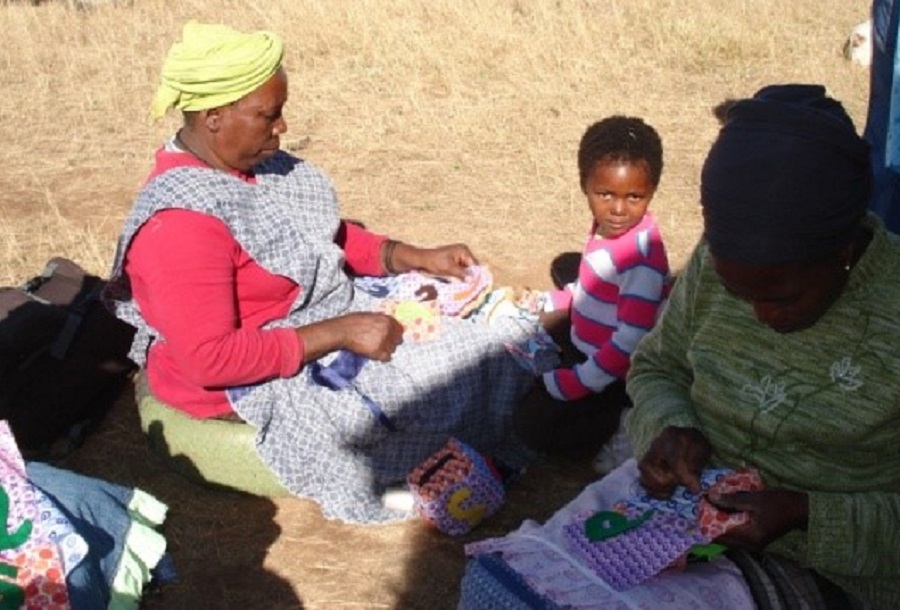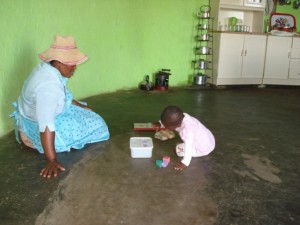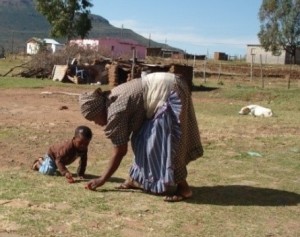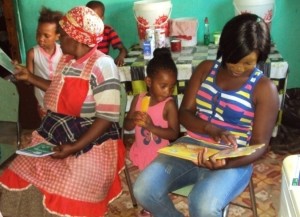Blog
Supporting intergenerational relationships in Eastern Cape Province, South Africa

In rural villages in the Eastern Cape Province in South Africa grandparents, especially grandmothers, often take care of young children.
This blog post is written by Fioni Murray, Director of Research and Evaluation at Khululeka Community Education Development Centre, which has developed an Infant and Toddler Course to support grandparents in their childrearing responsibilities and encourage them to be more involved in the play of their grandchildren.
At the Khululeka Community Education Development Centre we are of the firm belief that the family and other relationships that make up a child’s world should nurture and support his or her growth and development. A key focus area has been to build up a range of materials and resources to share with parents and grandparents that enhance child development and parenting skills through non-centre based programmes. These materials and resources are designed to lead to positive change in the lives of young children and their parents and caregivers, who are mostly elderly women, living in impoverished rural villages in the Eastern Cape Province of South Africa. Our goal is to reduce isolation and vulnerability at the household level while at the same time providing infants and toddlers with stimulating learning opportunities in the home.
Grandparents and toddlers enjoying playing together

When the programme started none of the children had access to toys, were largely left to their own devices and were discouraged, by their elders, from asking questions or playing in close proximity to them. Adults simply did not play with children. Various strategies were introduced during weekly visits by project team members to bring about the desired outcomes. One of the strategies was the gradual introduction of toys and books after a relationship of trust had been established between the caregiver and the child. This involved explaining the purpose of the toy or book and modeling how to play with it with the child. The caregiver was then left to interact with the child and encouraged to give feedback about this play at the next weekly home visit. We found all were eager to share what their children had done or accomplished at the subsequent visits. As their confidence in interacting with their children grew, so did the way they viewed young children and their play. This is how some of the grandmothers explained the change:
“I use to get tired to listen to the questions my grandchildren asked me – they are talking too much, I thought, and this annoyed me. Through these workshops, for which I am very thankful, I understand that talking is important, one of the ways children learn is asking questions. Now I don’t get annoyed, we talk and learn together.” Mrs. Dzedze
“I have never before had, or given myself, enough time to interact with my grandchild. Now that I do make time I enjoy it and I can see what a difference it makes to her, she loves telling me things and being with me when I am busy in the house.” Mrs Martins
Providing safe physical environments for young children

Another strategy has been to introduce gardening skills to parents and caregivers and share information about safe physical environments for young children. For Thabisa, the acquisition of gardening skills was the highlight of the workshops
“I am producing fresh vegetables that are healthy. I also like the way the workshops have helped me to be alert and observant in my environment. I know what to do to make a better environment for children – like pick up dangerous weapons (sharp rusty bits of metal, wire and broken glass) and not leave them lying there.”
Most caregivers are now making time to play or read with their children and are no longer chasing them away to “go play outside the yard so you don’t mess our yard”. They have set aside space, within their homes for children’s play and view household waste in a new light, starting to make improvised toys to add to those they received as part of the Infants and Toddlers Course.

Children are no longer shouted at but talked with and many look forward to a bedtime story. That health and safety can directly impact a child’s ability to grow and develop to their potential and that children also have rights was something that was new to most of the parents and grandparents who, once they were aware of this, actively started being more responsive caregivers.
During a visit to Pumla, who is caring for her 2 year-old grandson, Likho, I observe a playful interaction between the two. Pumla is taking care of Likho because his mother is in Gauteng looking for a job. She tells me, “My neighbours don’t approve of me playing like this at my age, but I don’t mind,” she shares. I ask what has brought about this change. “The course”, she explains. “The course, the Infants and Toddlers Course”. She warms to the subject, “this course has given me a lot of new knowledge about looking after this child – about making places where children can play safely, that talking and reading and listening to them is very important. Children learn by doing, that is why I am here letting him choose what we must do – not telling. It is not good to say to your child go play, don’t worry me and when the child asks you for things you must not chase them away, rather think what (they) can learn”. She pauses. “See, my yard is clean, before there were a lot of dangerous things. They were just things and I did not think about him getting hurt…My trainer says we must play with the our babies and be at their level – we were all shocked when we heard that, but now I like that and my child likes that. As I get up to leave. She adds –“I learnt about being a family. I learnt about being responsible for the early education of my grandchildren. I learnt to be a responsible caring granny and to love children.”
For more information about Khululeka’s programmes please contact Fioni Murray: fioni@khululeka.org.za